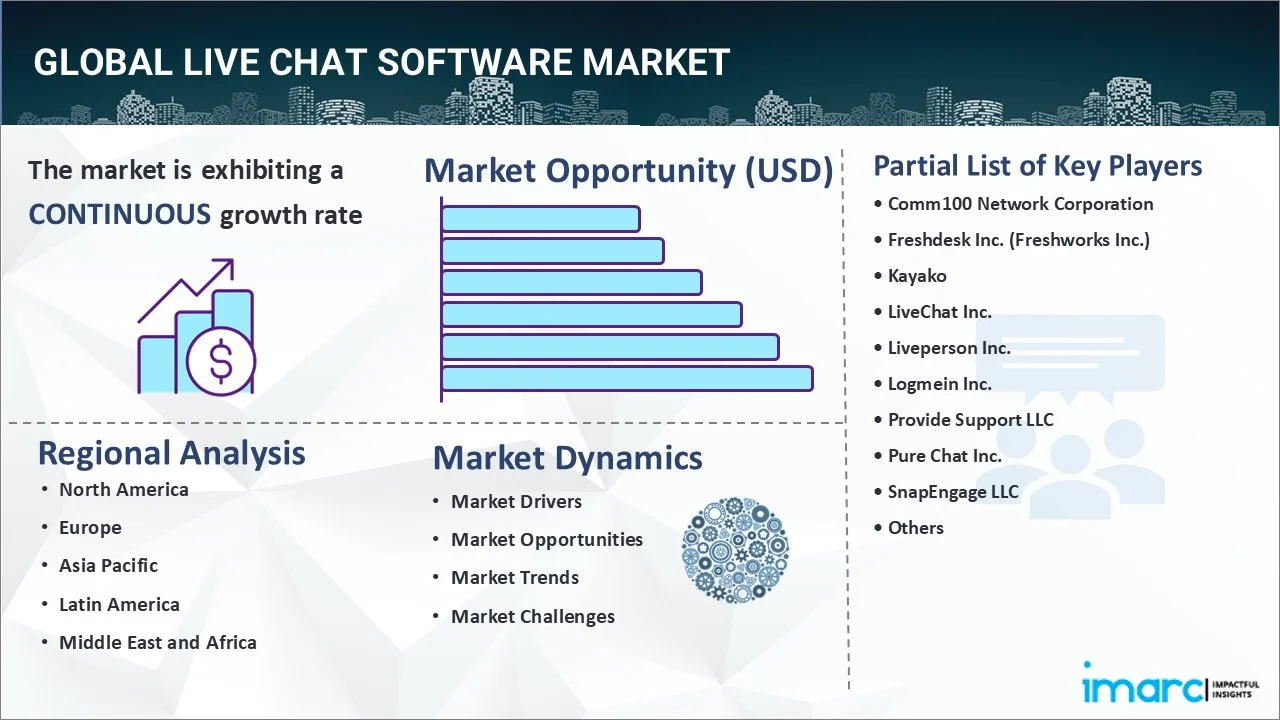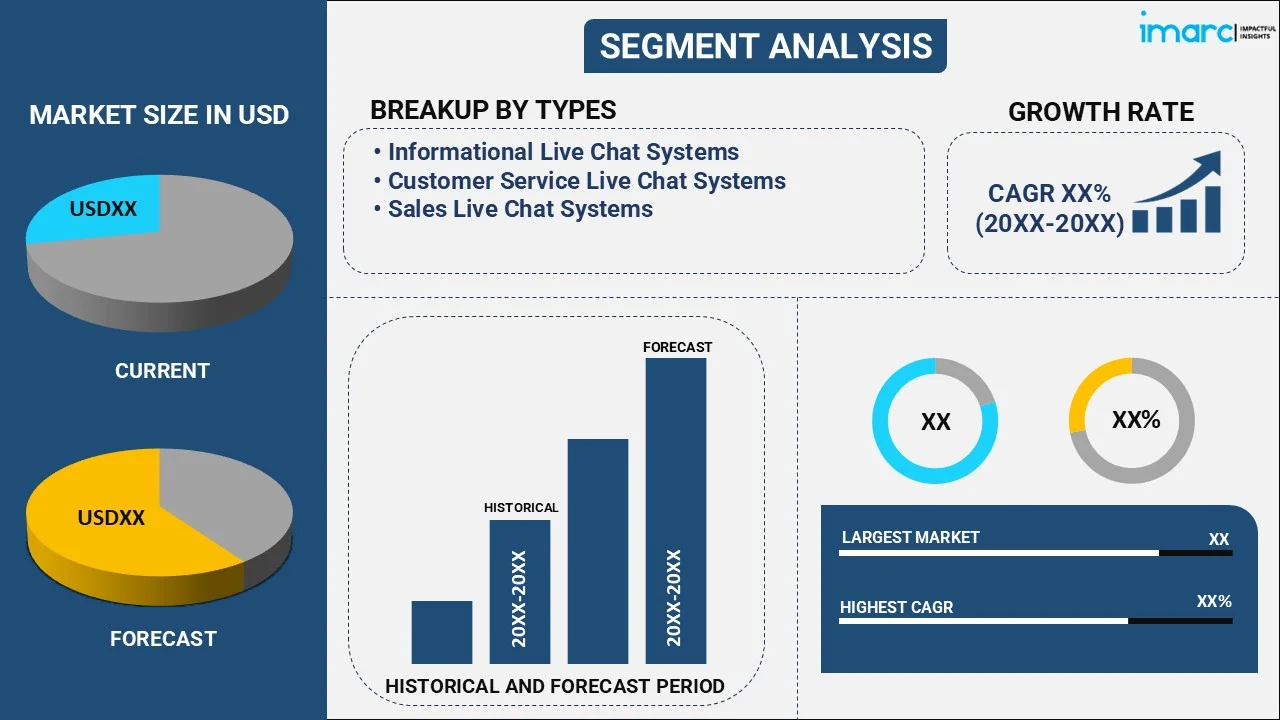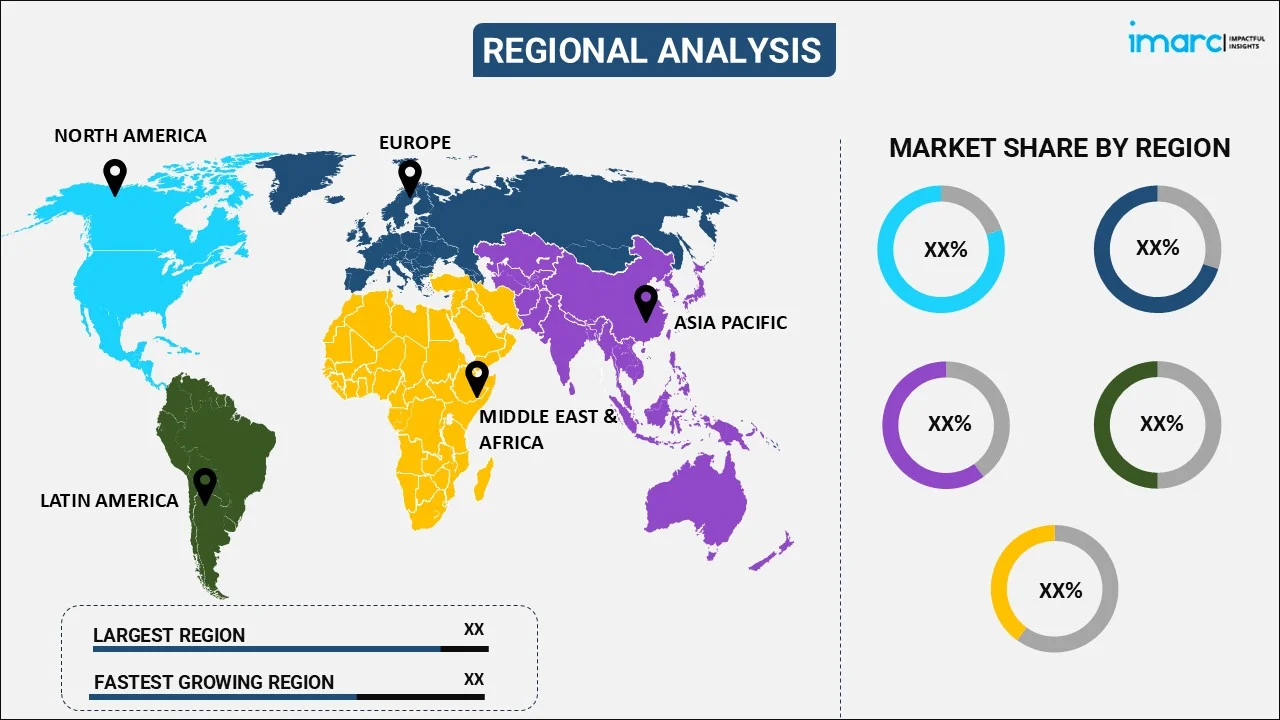
Live Chat Software Market Report by Type (Informational Live Chat Systems, Customer Service Live Chat Systems, Sales Live Chat Systems), Deployment Type (Cloud-based, On-premises), Application (BFSI, IT and Consulting, Retail and E-commerce, Travel and Hospitality, Telecommunication, Healthcare, Education, and Others), and Region 2025-2033
Live Chat Software Market Size:
The global live chat software market size reached USD 1,147.7 Million in 2024. Looking forward, IMARC Group expects the market to reach USD 2,169.8 Million by 2033, exhibiting a growth rate (CAGR) of 6.97% during 2025-2033. The increasing customer demand for real-time support, flourishing expansion of the e-commerce industry, significant advancements in artificial intelligence (AI) and chatbots, growing emphasis on customer experience, and the need for efficient customer engagement solutions are some of the factors contributing to the market growth.
|
Report Attribute
|
Key Statistics
|
|---|---|
|
Base Year
|
2024
|
|
Forecast Years
|
2025-2033
|
|
Historical Years
|
2019-2024
|
|
Market Size in 2024
|
USD 1,147.7 Million |
|
Market Forecast in 2033
|
USD 2,169.8 Million |
| Market Growth Rate (2025-2033) | 6.97% |
Live Chat Software Market Analysis:
- Major Market Drivers: The live chat software market forecast indicates that the market is primarily driven by the increasing demand for instant communication and quick issue resolution, particularly in sectors like e-commerce where customer satisfaction directly impacts sales. Besides this, the development of AI and machine learning (ML) has improved live chat capabilities, enabling prompt resolution of inquiries and round-the-clock assistance, thus bolstering the market growth. Furthermore, the surging integration of multiple digital touchpoints spurred by the need for seamless interactions across platforms is boosting the live chat software demand.
- Key Market Trends: The rising popularity of cloud-based live chat software due to its scalability, cost-effectiveness, and ease of deployment, enabling businesses to manage customer support efficiently is a key trend. Moreover, the advent of AI-powered chatbots and advanced analytics, improving response accuracy, and personalizing customer interactions are further strengthening the market growth. Moreover, the burgeoning growth of the retail and e-commerce sectors, where this software is employed for real-time support to reduce cart abandonment and enhance customer engagement is fostering market expansion.
- Geographical Trends: North America holds the largest market share due to its advanced technology infrastructure, high internet penetration, and early adoption of live chat solutions by major businesses and e-commerce platforms. Meanwhile, there is growing adoption of live chat software across other regions as various businesses worldwide increasingly recognize the benefits of real-time customer support and integrated solutions.
- Competitive Landscape: Some of the major market players in the live chat software industry include Comm100 Network Corporation, Freshdesk Inc. (Freshworks Inc.), Kayako, LiveChat Inc., Liveperson Inc., Logmein Inc., Provide Support LLC, Pure Chat Inc., SnapEngage LLC, Zendesk Inc, among many others.
- Challenges and Opportunities: The live chat software market overview shows that competition among numerous players and rapid technological changes can challenge market growth. However, expanding AI capabilities and integrating live chat with emerging technologies like augmented reality (AR) for enhancing customer experiences and creating new market niches present lucrative market opportunities.

Live Chat Software Market Trends:
Increasing demand for real-time customer support:
The modern consumer expects immediate responses and quick resolutions to their queries, leading to a heightened demand for real-time customer support. Businesses can meet these expectations by offering instantaneous communication channels through live chat software. This promptness is especially important in sectors like e-commerce, where client happiness and prompt issue resolution have a direct influence on revenue and repeat business. The convenience of live chat, allowing customers to multitask while waiting for responses, enhances user experience and drives customer preference for businesses that offer this service. Furthermore, real-time support reduces the need for lengthy email exchanges or phone calls, streamlining the customer service process and increasing operational efficiency for businesses, thus strengthening the market growth.
Integration of AI and chatbots:
Ongoing advancements in AI and ML are positively impacting the live chat software market outlook. AI-powered chatbots can now quickly and effectively handle a high volume of customer inquiries, respond to them right away, and handle common problems without the need for human intervention. This integration reduces the workload for human agents and ensures that customers receive immediate assistance, enhancing their overall experience. Chatbots can operate 24/7, providing continuous support and ensuring that customer queries are addressed outside of regular business hours. Additionally, AI-driven analytics and natural language processing (NLP) enable chatbots to understand and respond to customer inquiries more accurately, personalizing interactions and improving the quality of support. As AI technology continues to evolve, its integration into live chat software will likely become even more sophisticated, further bolstering the live chat software market growth.
Rise of omnichannel communication:
Omnichannel communication strategies are becoming more popular as a result of the expansion of digital communication channels. Customers now expect seamless interactions across various platforms, including websites, social media, mobile apps, and messaging services. Live chat software plays a crucial role in facilitating this seamless communication, allowing businesses to integrate chat functionalities across multiple channels. This integration ensures that customer interactions are consistent and cohesive, regardless of the platform they choose to use. Omnichannel communication also enables businesses to gather comprehensive customer data from various touchpoints, providing valuable insights into customer behavior and preferences. By leveraging this data, businesses can tailor their services and marketing strategies to meet customer needs better, thereby enhancing customer satisfaction and loyalty.
Live Chat Software Market Segmentation:
IMARC Group provides an analysis of the key trends in each segment of the market, along with forecasts at the global, regional, and country levels for 2025-2033. Our report has categorized the market based on type, deployment type, and application.
Breakup by Type:

- Informational Live Chat Systems
- Customer Service Live Chat Systems
- Sales Live Chat Systems
Customer service live chat systems account for the majority of the market share
The report has provided a detailed breakup and analysis of the market based on the type. This includes informational, customer service, and sales live chat systems. According to the report, customer service live chat systems represented the largest segment.
The increasing need for customer service live chat systems due to their critical role in enhancing customer experience and satisfaction is boosting the live chat software market size. In addition to this, these systems offer immediate, real-time assistance, addressing customer inquiries and issues efficiently, which is crucial in sectors like e-commerce, where timely support directly impacts sales and retention. They also reduce operational costs by decreasing the volume of phone calls and emails, enabling support agents to handle multiple queries simultaneously. Moreover, the integration of AI and chatbots within these systems further streamlines support processes, providing 24/7 assistance and improving response times. Consequently, the convenience, efficiency, and effectiveness of customer service live chat systems make them indispensable in the market.
Breakup by Deployment Type:
- Cloud-based
- On-premises
Cloud-based holds the largest share of the industry
A detailed breakup and analysis of the market based on the deployment type have also been provided in the report. This includes cloud-based and on-premises. According to the report, cloud-based accounted for the largest market share.
The increasing demand for cloud-based live chat software owing to its scalability, cost-effectiveness, and ease of deployment is boosting live chat software market share. In line with this, businesses prefer cloud solutions as they eliminate the need for extensive information technology (IT) infrastructure, reducing initial setup and maintenance costs. These systems offer flexible scalability, allowing companies to adjust resources based on demand without significant investments. Cloud-based live chat software also provides seamless updates and access to advanced features, ensuring businesses stay competitive with the latest technology. Furthermore, the accessibility of cloud-based solutions enables support teams to operate remotely, enhancing flexibility and operational efficiency. The combination of these benefits drives the widespread adoption of cloud-based live chat software, impelling the market growth.
Breakup by Application:
- BFSI
- IT and Consulting
- Retail and E-commerce
- Travel and Hospitality
- Telecommunication
- Healthcare
- Education
- Others
Retail and e-commerce represent the leading market segment
The report has provided a detailed breakup and analysis of the market based on the application. This includes BFSI, IT and consulting, retail and e-commerce, travel and hospitality, telecommunication, healthcare, education, and others. According to the report, retail and e-commerce represented the largest segment.
Based on the live chat software market research report, the retail and e-commerce sector represents the leading market segment in the live chat software market due to its critical need for immediate customer support to enhance shopping experiences and boost sales. Live chat enables retailers to offer real-time assistance, answer product inquiries, resolve issues promptly, and guide customers through the purchase process, significantly reducing cart abandonment rates. This immediate interaction improves customer satisfaction and fosters loyalty. Concurrent with this, live chat also supports personalized customer engagement and upselling opportunities, leveraging AI and analytics to tailor responses and recommendations. The high volume of transactions and customer interactions in retail and e-commerce spurring the demand for efficient, scalable customer support solutions is propelling the live chat software market value.
Breakup by Region:

- North America
- United States
- Canada
- Asia Pacific
- China
- Japan
- India
- South Korea
- Australia
- Indonesia
- Others
- Europe
- Germany
- France
- United Kingdom
- Italy
- Spain
- Russia
- Others
- Latin America
- Brazil
- Mexico
- Others
- Middle East and Africa
North America leads the market, accounting for the largest live chat software market share
The report has also provided a comprehensive analysis of all the major regional markets, which include North America (the United States and Canada); Asia Pacific (China, Japan, India, South Korea, Australia, Indonesia, and others); Europe (Germany, France, the United Kingdom, Italy, Spain, Russia, and others); Latin America (Brazil, Mexico, and others); and the Middle East and Africa. According to the report, North America represents the largest regional market for live chat software.
North America leads the market due to its advanced technological infrastructure, high internet penetration, and early adoption of innovative customer service solutions. The region's strong presence of major technology companies and e-commerce giants drives significant demand for live chat software to enhance customer engagement and support. Businesses in North America prioritize customer experience, leveraging live chat to provide real-time assistance, improve satisfaction, and maintain competitive advantage. Along with this, the widespread use of AI and ML technologies in the region further enhances the capabilities of live chat systems. The robust economy and high disposable income levels are further bolstering the live chat software market revenue.
Competitive Landscape:
- The market research report has also provided a comprehensive analysis of the competitive landscape in the market. Detailed profiles of all major companies have also been provided. Some of the major market players in the live chat software industry include Comm100 Network Corporation, Freshdesk Inc. (Freshworks Inc.), Kayako, LiveChat Inc., Liveperson Inc., Logmein Inc., Provide Support LLC, Pure Chat Inc., SnapEngage LLC, Zendesk Inc., etc.
(Please note that this is only a partial list of the key players, and the complete list is provided in the report.)
- The competitive landscape is characterized by a diverse range of players offering various solutions to cater to different business needs. Producers dominate the market with comprehensive, feature-rich platforms that integrate live chat with customer support, customer relationship management (CRM), and analytics tools. Established live chat software companies compete on functionality, ease of use, and integration capabilities. Emerging companies and startups often differentiate themselves through niche features, advanced AI capabilities, or specialized industry solutions. Furthermore, cloud-based providers are becoming increasingly prominent, offering scalable and cost-effective solutions. The competitive environment is further intensified by rapid technological advancements, such as AI-driven chatbots and omnichannel support integration, driving continuous innovation. Pricing strategies, customer support, and the ability to offer customizable solutions also play crucial roles in shaping competition in the live chat software industry.
Live Chat Software Market News:
- In April 2024, REVE Chat launched version 4.0, merging Instant Messaging (IM) with Live Chat functionalities. This update transforms websites into immersive IM platforms, enabling enterprises to initiate and complete more chats directly on their sites. The innovative approach enhances engagement, drives higher conversion rates, and reduces overall digital promotional costs, marking a significant advancement in the customer engagement space.
- In April 2024, Automattic, the owner of WordPress, acquired the Beeper app for a reported $125 million. Beeper's CEO, Eric Migicovsky, announced the acquisition in a blog post, confirming he will become Automattic's head of messaging. Beeper, a universal chat app with 115,000 beta users, integrates 14 chat networks.
Live Chat Software Market Report Scope:
| Report Features | Details |
|---|---|
| Base Year of the Analysis | 2024 |
| Historical Period | 2019-2024 |
| Forecast Period | 2025-2033 |
| Units | Million USD |
| Scope of the Report | Exploration of Historical Trends and Market Outlook, Industry Catalysts and Challenges, Segment-Wise Historical and Future Market Assessment:
|
| Types Covered | Informational Live Chat Systems, Customer Service Live Chat Systems, Sales Live Chat Systems |
| Deployment Types Covered | Cloud-based, On-premises |
| Applications Covered | BFSI, IT and Consulting, Retail and E-commerce, Travel and Hospitality, Telecommunication, Healthcare, Education, Others |
| Regions Covered | Asia Pacific, Europe, North America, Latin America, Middle East and Africa |
| Countries Covered | United States, Canada, Germany, France, United Kingdom, Italy, Spain, Russia, China, Japan, India, South Korea, Australia, Indonesia, Brazil, Mexico |
| Companies Covered | Comm100 Network Corporation, Freshdesk Inc. (Freshworks Inc.), Kayako, LiveChat Inc., Liveperson Inc., Logmein Inc., Provide Support LLC, Pure Chat Inc., SnapEngage LLC, Zendesk Inc., etc. |
| Customization Scope | 10% Free Customization |
| Post-Sale Analyst Support | 10-12 Weeks |
| Delivery Format | PDF and Excel through Email (We can also provide the editable version of the report in PPT/Word format on special request) |
Key Benefits for Stakeholders:
- IMARC’s industry report offers a comprehensive quantitative analysis of various market segments, historical and current market trends, market forecasts, and dynamics of the live chat software market from 2019-2033.
- The research report provides the latest information on the market drivers, challenges, and opportunities in the global live chat software market.
- The study maps the leading, as well as the fastest-growing, regional markets. It further enables stakeholders to identify the key country-level markets within each region.
- Porter's five forces analysis assists stakeholders in assessing the impact of new entrants, competitive rivalry, supplier power, buyer power, and the threat of substitution. It helps stakeholders to analyze the level of competition within the live chat software industry and its attractiveness.
- The competitive landscape allows stakeholders to understand their competitive environment and provides insight into the current positions of key players in the market.
Key Questions Answered in This Report
The global live chat software market was valued at USD 1,147.7 Million in 2024.
We expect the global live chat software market to exhibit a CAGR of 6.97% during 2025-2033.
The rising adoption of cloud-based live chat software among numerous organizations to enhance Customer Relationship Management (CRM) and improve user experience is primarily driving the global live chat software market.
The sudden outbreak of the COVID-19 pandemic has led to the growing consumer inclination towards online retail platforms for the purchase of numerous products resulting in the increasing demand for live chat software, to provide 24x7 customer support, handle queries, and resolve other issues.
Based on the type, the global live chat software market can be segmented into informational live chat systems, customer service live chat systems, and sales live chat systems. Currently, customer service live chat systems hold the majority of the total market share.
Based on the deployment type, the global live chat software market has been divided into cloud-based and on-premises, where cloud-based deployment currently exhibits a clear dominance in the market.
Based on the application, the global live chat software market can be categorized into BFSI, IT and consulting, retail and e-commerce, travel and hospitality, telecommunication, healthcare, education, and others. Among these, the retail and e-commerce sector accounts for the largest market share.
On a regional level, the market has been classified into North America, Asia Pacific, Europe, Latin America, and Middle East and Africa, where North America currently dominates the global market.
Some of the major players in the global live chat software market include Comm100 Network Corporation, Freshdesk Inc. (Freshworks Inc.), Kayako, LiveChat Inc., Liveperson Inc., Logmein Inc., Provide Support LLC, Pure Chat Inc., SnapEngage LLC, and Zendesk Inc.
Need more help?
- Speak to our experienced analysts for insights on the current market scenarios.
- Include additional segments and countries to customize the report as per your requirement.
- Gain an unparalleled competitive advantage in your domain by understanding how to utilize the report and positively impacting your operations and revenue.
- For further assistance, please connect with our analysts.
 Request Customization
Request Customization
 Speak to an Analyst
Speak to an Analyst
 Request Brochure
Request Brochure
 Inquire Before Buying
Inquire Before Buying




.webp)




.webp)












